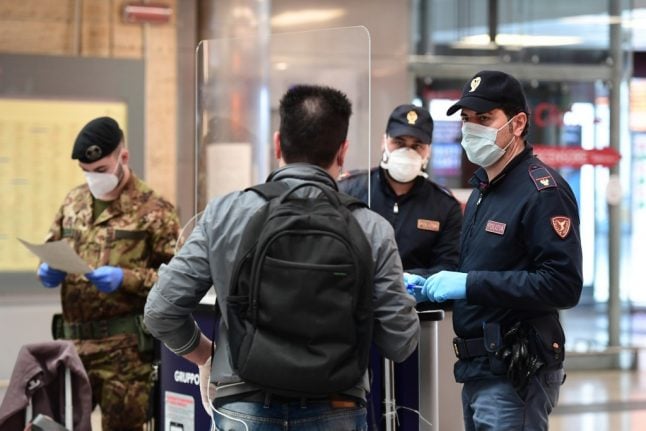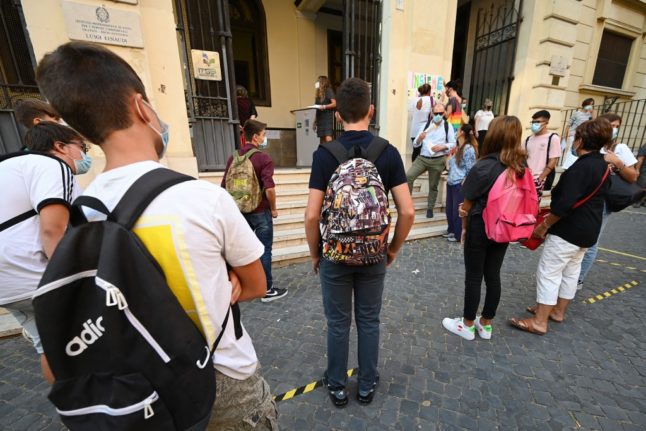We have chosen to make this article paywall free. The Local's future relies on our readers signing up as Members. Please consider joining our community. For more information, click here.
Italy moves into “phase two” of its lockdown measures on Monday, May 4th, and while quarantine is easing rather than ending, the rules have changed slightly under the government's latest decree.
To reflect these changes, the government has issued a new version of the self-declaration form needed whenever you leave the house.
PHASE TWO EXPLAINED: What changes in Italy from May 4th?
Tight restrictions on movement remain, meaning anyone leaving the house will still need to complete the autodichiarazione or 'self-declaration' form.
The form “will remain as long as there are limitations” on travel, Prime Minister Giuseppe Conte has stated.
We don't know how long that will be in total, but we do know that the current rules are valid from May 4-17th – so you can expect to need the permission slip for at least another two weeks.
The latest version of the form
Here's what the updated autodichiarazione looks like, as of May 4th:

Not much has changed: the only difference is that a few lines specifying what counts as an “absolute emergency” and “situation of necessity”, as well as the examples of what to write as your reason for going outside, have been removed.
In fact, the Interior Ministry has said that you can continue to use the previous version of the form (dated March 26th) and simply cross out the relevant sections.
Here's how that should look:

The form is available to download here.
Police officers can also supply you with a paper copy of the form to fill out if and when they stop you, the Interior Ministry says.
What has changed?
Though the new form doesn't make it explicit, the government has expanded its list of acceptable reasons for going outside.
As well as to go to work, buy necessities, for health emergencies or exercising, you are now allowed to travel within your own region to visit relatives (defined as spouses, partners, parents, children, in-laws, siblings, aunts and uncles, nieces and nephews, cousins and cousins' children – but not friends).
READ ALSO:
- Who exactly are you allowed to visit under Italy's 'phase two' lockdown rules?
- Q&A: Italy's new rules on going outside in lockdown phase two
- CALENDAR: What will Italy reopen first under new lockdown rules?
You are also able to return to your place of permanent residence, even if it means crossing from one region to another. Once you return to your home region, you should stay there: you can't go back and forth between two addresses.
Since a number of businesses are reopening from May 4th, more people will be returning to work and more shops will be open. Many towns have also reopened their parks. Going to your local shops or nearby park is considered a legitimate reason to be outside, so long as you respect guidelines on social distancing and face masks.
How do you fill out the form?
The form is essentially an official declaration that you haven't tested positive for Covid-19 and aren't subject to quarantine; you're aware of the national and regional travel restrictions in force; the information you provide is true; and you understand that making a false claim is punishable by law.
It asks for the following information (in order):
- Full name
- Date of birth
- Place of birth
- Where you're officially resident
- Where you're currently living/staying (which can be different to your official residence)
- Form of ID (e.g. passport, ID card)
- ID number
- Telephone number
- Where you're departing from
- Where you're going to
- Region you're departing from
- Region you're travelling to (if applicable)
- If travelling between regions, the circumstances for travel as permitted under the relevant regional rules
- Reason for travel: work; emergency; necessity; health
- Details of reason for travel
- Date, time and place you're handing in the form
- Signature
The form should be filled out in Italian. Ask someone to help you if you're not sure what to write.
Can you still be fined?
While freedom of movement remains restricted in Italy you can still be fined for breaking the rules: up to €3,000, or even more in some regions.
Italian newspaper reports suggest that police will no longer be quite so strict about checking forms, however, with some suggesting that people don't need to carry one while they're exercising and that employees going to work can simply show their work ID.
From now on police patrols will focus mainly on preventing and breaking up gatherings, according to La Repubblica.
Realistically police can't check everyone's papers, and whether they punish you is at each officer's discretion. Many people will probably just be told to go back home.
But the only way to be sure of avoiding problems is to follow the rules the Italian authorities have set, described above.



 Please whitelist us to continue reading.
Please whitelist us to continue reading.
The new travel rules from 4 May ban travel between regions. I am currently renting in Lucca. Does the new rule mean I can travel anywhere in Tuscany and so rent in another town?
Yes.
It would be very helpful if you could post the form in English.